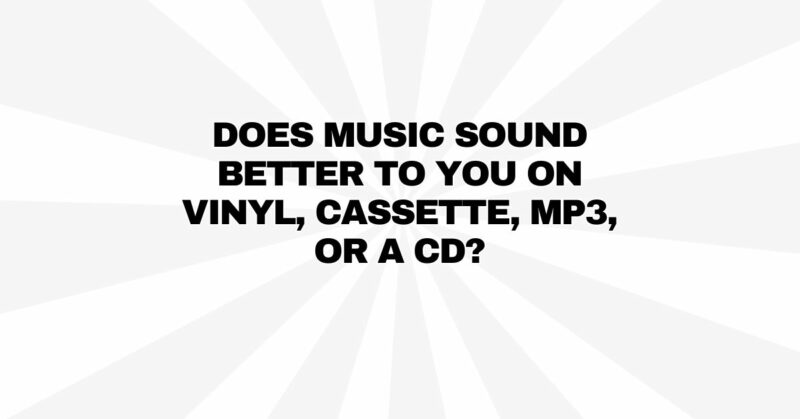The question of which music format sounds the best is one that has sparked passionate debates among audiophiles, music enthusiasts, and casual listeners for years. Each format – vinyl, cassette, MP3, and CD – has its own unique characteristics that influence how music is experienced. The perception of superior sound quality often varies from person to person, depending on individual preferences, equipment, and the listening environment. To understand this complex issue, let’s explore each format’s qualities and delve into the factors that can shape one’s preference for one over the other.
1. Vinyl Records: The Analog Warmth
Vinyl records have experienced a remarkable resurgence in popularity in recent years, thanks to their nostalgic appeal and the unique audio experience they offer. Here’s why some listeners argue that music sounds better on vinyl:
- Analog Nature: Vinyl records store music as analog signals, etched onto the surface as grooves. When played back with a turntable and stylus, the analog nature of vinyl is believed to provide a warmer, more organic sound that resonates with many audiophiles.
- Dynamic Range: Vinyl records often boast a wider dynamic range than digital formats like CDs or MP3s. This means that they can capture and reproduce subtle nuances in the music, which is particularly appreciated in genres like jazz and classical.
- Tactile Experience: Handling vinyl records adds a tactile and interactive dimension to the music-listening process. The act of carefully placing the needle, observing the spinning disc, and flipping the record can enhance the overall enjoyment.
- Collectibility: Vinyl records are often seen as collectible items, with limited editions, special pressings, and unique colored vinyl releases. Collectors are drawn to vinyl for its exclusivity and value.
2. Cassette Tapes: The Nostalgic Hum
Cassette tapes have a distinct sound that some listeners find endearing and nostalgic. Here’s why some might argue in favor of cassettes:
- Warmth and Hiss: Cassette tapes are known for their characteristic warm and sometimes lo-fi sound. They often introduce a gentle hiss and subtle warble that some people find charming and reminiscent of an earlier era.
- Mixtapes and Personalization: Cassettes were a popular medium for creating mixtapes, allowing listeners to curate and personalize their music collections. The sentimental value of these homemade mixtapes adds to the appeal of cassette tapes.
3. MP3 and Digital Formats: Convenience and Portability
MP3s and other digital formats represent the modern era of music consumption. They have their own set of advantages, which have made them the dominant format for many listeners:
- Convenience: Digital formats offer unparalleled convenience. Music can be instantly streamed or downloaded, and playlists can be created and shared effortlessly. Skipping tracks, shuffling, and quick access to vast libraries of music are all part of the digital listening experience.
- Portability: Digital music can be stored on devices like smartphones and played through headphones or portable speakers, making it ideal for on-the-go listening.
- Consistency: Digital formats offer consistent sound quality, provided the file is not heavily compressed. There are no concerns about physical wear or degradation over time.
4. Compact Discs (CDs): Digital Precision
Introduced in the 1980s, CDs represented a leap forward in audio technology. Here’s why some listeners prefer CDs:
- Digital Clarity: CDs store music as digital data, resulting in precise and clear sound reproduction. This digital precision eliminates the imperfections often associated with analog formats.
- Durability: CDs are robust and resistant to physical damage. They are not susceptible to scratches or warping, ensuring consistent sound quality over time.
- Artwork and Booklets: CDs often come with detailed artwork, lyrics, and booklets that enhance the overall music-listening experience.
Subjectivity in Sound Perception
The perception of which music format sounds better is highly subjective and can be influenced by individual preferences, nostalgia, and the equipment used for playback. Audiophiles with high-end turntables and speakers may have a deeper appreciation for the nuances of vinyl, while someone listening on budget headphones might prefer the convenience and clarity of digital formats.
Additionally, advancements in audio technology have blurred the lines between formats. High-resolution audio and lossless compression formats have made digital music sound more appealing to audiophiles, closing the gap between analog and digital sound quality.
In conclusion, whether music sounds better on vinyl, cassette, MP3, or CD ultimately depends on personal preferences, emotional connections, and the listening context. Each format has its unique charm, and the beauty of music lies in its ability to evoke emotions, memories, and personal experiences, regardless of the medium through which it is enjoyed. Ultimately, the “best” format is the one that brings the most joy and connection to the music for each individual listener.


